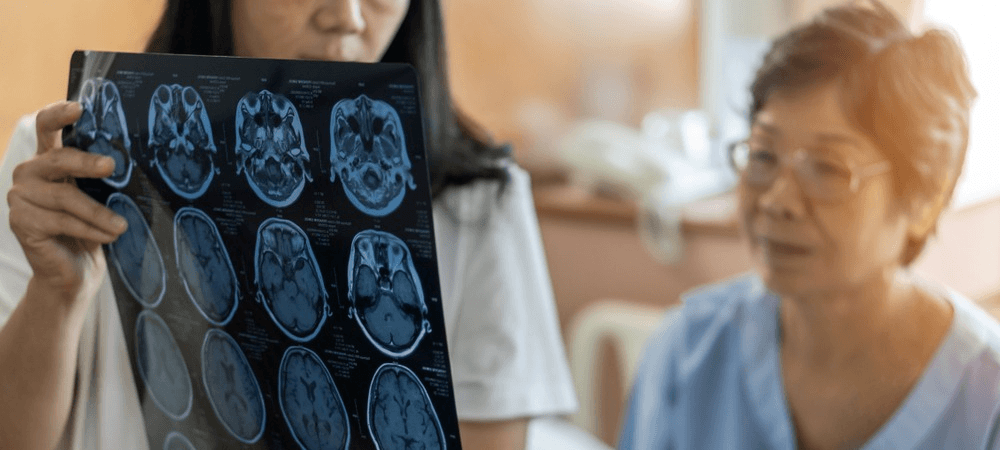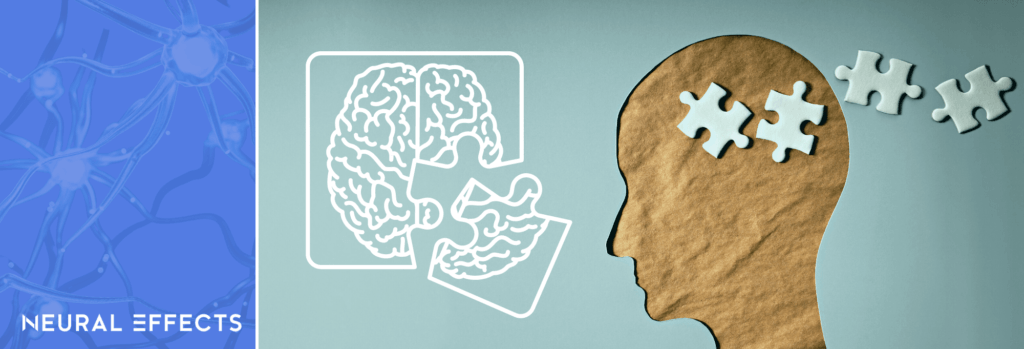Misplacing car keys. Forgetting the name of a new friend. Struggling to find the right word in a conversation. Walking into a room and forgetting what you needed. Sometimes feeling a bit low.
If you or a loved one are experiencing these symptoms, you might worry they are due to dementia. If you can retrace your steps to find the keys, or jog your memory to remember the name of that new restaurant you’re recommending to a friend, then your symptoms could just be from the mild forgetfulness that comes with getting older.
But having a hard time doing everyday things like driving, using the phone, and finding your way home is less likely part of normal aging and may be a sign of dementia onset.
Dementia involves a slow cognitive decline in memory, thinking, learning, executive function, and reasoning skills. For example, you may have noticed someone you care for keeps struggling to remember what they did yesterday or forgets the names of everyday objects. They may also have difficulty following conversations and often feel agitated and confused even in a familiar environment.
A doctor can help you distinguish between the signs of normal aging and the signs of dementia. Identifying dementia early opens the door to different treatment options, like the therapy we offer at Neural Effects. While dementia has no cure, early diagnosis and treatment can delay the progression of symptoms.
In this article, we’ll look at:
- The main types of dementia
- Early signs of dementia
- Examples of dementia symptoms versus normal aging
- The diagnostic process
- Ways to manage symptoms
- Treatment at Neural Effects
Neural Effects uses the latest evidence-based techniques to stimulate the areas of your brain that need the most help. We are located in Provo, Utah, and serve anyone in Salt Lake City or the Utah valley area. We are in-network for most types of medical insurance. Schedule your evaluation today.
What is Dementia?
Dementia is a term used to describe a group of symptoms affecting cognitive function to such an extent that they interfere with daily activities and independent function. Dementia is a progressive disease, which means it starts with mild symptoms but gradually gets worse. Eventually, patients’ health deteriorates and they become completely dependent on others.
According to the 2019 Alzheimer’s Disease Facts and Figures published by the Alzheimer’s Association®, more than 5.8 million people in the U.S. are living with Alzheimer’s, including 200,000 patients younger than 65 who have been diagnosed with early-onset dementia. This means about one in 10 people aged 65 and older have dementia, but the risk of developing this disease increases with age: 3% of people age 65-74, 17% of people age 75-84, and 32% of people age 85 and older have Alzheimer’s dementia.
For a doctor to diagnose dementia, the symptoms must be severe enough to disrupt normal daily life. This means, for example, having problems paying bills or driving safely. Patients who are experiencing some cognitive symptoms but continue to live a normal and independent life may get a diagnosis of mild cognitive impairment (MCI). This is not a type of dementia, and not all patients with MCI will go on to develop dementia.
Find out more about symptoms, diagnosis, and treatment for MCI.
Types of Dementia

As described earlier, dementia is an umbrella term that includes many different conditions. Dementias are grouped by what they have in common.
Some conditions cause some of the same symptoms as dementia (e.g., poor memory, problems with decision-making, and so on), but unlike dementia, these conditions can improve significantly with treatment. We also include a few examples in this article (see below).
To skip straight to the discussion of symptoms, click here.
Common Types of Dementia
Some common types of dementia include Alzheimer’s disease, vascular dementia, Lewy body dementia, frontotemporal dementia, and mixed dementia.
Alzheimer’s disease. Alzheimer’s is the most common form of dementia, accounting for 60-80% of all cases. Patients with Alzheimer’s develop plaques and tangles in the brain. Plaques are clumps of a protein called beta-amyloid which develop outside neurons, and tangles are twisted strands of a protein called tau, which stockpiles inside neurons. As these structures gradually accumulate in the brain, they damage and eventually kill nerve cells, resulting in more symptoms.
Vascular dementia: This type of dementia is caused by damage to the blood vessels that supply oxygen and nutrients to brain cells. Sometimes this damage comes from a large stroke or a series of mini-strokes. In other cases, it can be due to the deterioration of small blood vessels over a long period of time. About 5-10% of patients with dementia are diagnosed with vascular dementia.
The most common symptoms of vascular dementia include difficulties with problem-solving, loss of focus, and struggling with organization. These symptoms are often more noticeable than memory loss, which is the hallmark sign of Alzheimer’s.
Lewy body dementia (LBD): In patients with this type of dementia, tiny balloon-shaped clumps of a protein called alpha-synuclein appear in the nerve cells of the brain. These are known as Lewy bodies, after F.H. Lewy, the German doctor who first identified them. About 4-8% of patients with dementia are diagnosed with this type, but most people with evidence of LBD also have Alzheimer’s disease. In addition, LBD has many symptoms in common with Alzheimer’s disease, making a precise diagnosis difficult.
This is similar to the type of dementia developed by patients with Parkinson’s disease. The main difference is that cognitive symptoms develop before coordination symptoms in dementia with Lewy bodies. (It’s the reverse in Parkinson’s disease.)
Frontotemporal dementia (FTD): This type of dementia is not a single disease, but a group of diseases involving the breakdown of nerve cells and their connections in a specific part of the brain: the frontal and temporal lobes. As more nerve cells are damaged and die, the brain tissue in these areas starts to shrink, affecting more brain functions. FTD accounts for less than 1% of dementia cases.
These brain regions are associated with personality, behavior, and language; common symptoms of FTD include behavior problems, personality changes, judgment issues, and difficulties with speaking and writing.
Frontotemporal dementia usually affects either the frontal or the temporal lobes more predominantly, causing different symptoms. When it affects the frontal lobes, it causes problems with behavior and personality. These lobes process the information that controls how we behave in certain situations, along with helping us to plan, solve problems, and focus. When it targets the temporal lobes, patients are more likely to experience language problems. For example, a key function of the temporal lobe is to store the meanings of words and the names of objects, allowing people to recognize familiar faces and objects.
Mixed dementia: Studies indicate that up to 50% of people with dementia have a combination of different types, including Alzheimer’s, vascular dementia, or Lewy body dementia. This condition is called mixed dementia and is more common in patients over 75 years old. Occasionally, it can be a combination of three types, but more commonly it’s a mixture of two different types. Alzheimer’s paired with vascular dementia or Alzheimer’s and Lewy body dementia are common diagnoses.
Conditions with Symptoms That Overlap with Dementia

Some health conditions may cause symptoms similar to dementia (but unlike dementia, are entirely treatable). Ruling out or treating these conditions is one of the reasons seeking a formal diagnosis is so important.
Here are some examples of medical conditions with symptoms that overlap with dementia:
- Urinary tract infections: Symptoms that look like dementia may be the result of untreated infections in the body. One of the most common examples in older people involves urinary tract infections, especially if the infection spreads to the bladder and kidneys. Patients with an untreated infection may feel confused, upset, or sleepy; may have trouble paying attention; and may even start hallucinating.
- Thyroid disease: Undiagnosed hypo- or hyperthyroidism can affect mental health. If the thyroid doesn’t produce enough thyroid hormone (hypothyroidism), parts of the body work too slowly and might affect brain health. On the other hand, if the thyroid is overactive (hyperthyroidism), patients may struggle with focus, feelings of anxiety, and depression.
- Diabetes: If someone has undiagnosed or uncontrolled diabetes, their blood sugar levels can drop very quickly, which means the brain doesn’t have enough fuel to work as it should. This condition is called hypoglycemia. In severe cases, patients can get confused even when doing simple tasks.
- Nutritional deficiencies: Some vitamin deficiencies, especially a lack of vitamins B1, B6, B12, copper, or vitamin E, can cause dementia-like symptoms.
- Medication side effect: Some types of prescription drugs — including antihistamines, anti-nausea medicine, steroids, and bladder relaxants — can cause symptoms that look like dementia. There is a greater risk of side effects in elderly patients because the older you get, the harder it is for the body to fight the toxic effects of drugs. In addition, it’s more likely that these patients are taking multiple drugs, increasing the risk of interactions and side effects.
Note: While depression can be caused by dementia, there are many other reasons someone may develop depression. It’s important to evaluate mental health changes in the context of the person’s personal and medical history and to have them treated accordingly.
Symptoms of Dementia Onset

It’s not easy to spot the early signs of dementia. Warning signs and symptoms vary greatly from person to person, and they’re usually very mild for the first couple of years.
In the early stages of dementia, the following symptoms may affect the person’s daily life:
- Memory loss
- Coordination difficulties
- Difficulties with problem-solving
- Difficulties with language and communication
- Poor sense of direction and time
- Visual-spatial difficulties
- Mood swings
Memory loss
This is perhaps the most well-known symptom associated with dementia. The changes can be very subtle at first and tend to involve short-term memories. For example, patients may forget what they had for breakfast but vividly remember their wedding day 50 years ago.
Patients with dementia may also:
- Forget where they leave everyday items, like glasses or keys
- Struggle to remember what they wanted when they go into another room
- Forget what they were supposed to do, like going to a doctor appointment or a family commitment
- Forget recent events
- Develop repetitive behavior, such as asking the same question multiple times because they forgot the answer
Memory loss is often the first and most relevant symptom in early Alzheimer’s disease. Although less common, it’s also seen in patients with vascular and Lewy body dementia, but it’s rare in patients with early frontotemporal dementia.
Coordination Difficulties
Patients with dementia may start losing physical coordination skills. These symptoms may include anything where the patient needs to use their hands, such as undoing buttons, tying shoelaces, or brushing their teeth. Often, these signs start in a subtle manner, such as putting down items too close to the edge of a table.
Difficulties with Problem-solving and Decision-making
Patients with dementia may find it harder to complete daily tasks which involve making complex decisions or solving problems. Some examples include paying monthly bills or following a complicated recipe.
Patients may also start to lose the ability to carry out many of the chores they would normally do easily, such as cooking meals or keeping the house clean. Deciding what to wear or maintaining adequate personal hygiene also becomes increasingly difficult.
Worryingly, patients with dementia may not comprehend dangerous situations, like crossing a busy road or wearing summer clothes on a cold winter day.
Another hallmark of poor decision-making in patients with dementia is the inability to make good financial judgments. Patients who were savvy about their money before may start giving it away to strangers or get easily scammed.
Language and Communication
Patients with dementia may find it difficult to communicate with others. That could involve struggling to find the right word or to follow a conversation, especially if the conversation is taking place in a noisy place or with more than one person. Speech is particularly affected in patients with vascular dementia and some types of frontotemporal dementia.
It can be hard for these patients to explain something without losing their train of thought, and they often stop in the middle of a sentence and don’t know how to continue. Patients may use the wrong words or have difficulty describing a familiar item. They often find it hard to understand jokes and subtle meanings. Understandably, these changes can be very challenging for family members and caregivers, as well as for the patient.
Poor Sense of Direction and Time
Sense of direction commonly starts to get worse with the onset of dementia. It’s common for patients to get lost, even in places that are familiar to them. They may also experience some difficulty following directions to get to a certain place.
Some indications of temporal disorientation include mixing night and day (by sleeping during the day and staying awake at night), not knowing what month or even what year it is, or getting ready for an appointment on the wrong day.
Visual-spatial Difficulties
Patients with dementia also experience visual and spatial difficulties. Dementia disrupts how the brain processes information from the eyes and ears, which changes how a person understands the world around them.
These changes can affect a patient’s spatial awareness and ability to judge distances, making it difficult to use stairs or park a car. These changes occur more frequently in early-stage Alzheimer’s disease and Lewy body dementia than in vascular dementia or frontotemporal dementia.
Changes in Mood and Emotions
Changes in mood are also common in patients with dementia. Many patients experience depression and anxiety during the early stages. They might get very upset if their routine is changed and they find themselves in unfamiliar situations. Others become withdrawn, feel less confident, and lose interest in hobbies they used to enjoy.
It’s not common in Alzheimer’s, but severe changes in behavior may occur in patients with frontotemporal dementia. These patients lose their inhibitions and start behaving in socially inappropriate ways or become impulsive and lose empathy for others.
Neural Effects uses the latest evidence-based techniques to stimulate the areas of your brain that need the most help. We are located in Provo, Utah, and serve anyone in Salt Lake City or the Utah valley area. We are in-network for most types of medical insurance. Schedule your evaluation today.
Symptoms of Specific Types of Dementia

With varying degrees, all symptoms described above apply to patients with dementia. However, depending on what type of dementia the patient is suffering, some symptoms may be more prevalent or appear in a different order. Some symptoms are more specific to specific types of dementia.
Symptoms Specific to Alzheimer’s Disease
Alzheimer’s Disease is the most common type of dementia, and therefore, patients with this type of dementia experience many of the symptoms associated with dementia, including:
- Poor short-term memory (forgetting recent events, names, and faces)
- Asking the same question repeatedly
- Difficulty with tasks and activities that need organization and planning skills
- Confusion in unfamiliar environments
- Difficulty finding the right words
- Difficulty handling money
- Withdrawn or anxious behaviors
- Poor judgment
Symptoms Specific to Vascular Dementia
Symptoms experienced by patients with vascular dementia are similar to those with Alzheimer’s disease, although short-term memory problems only become obvious in the later stages. In some patients, these symptoms develop suddenly and rapidly worsen, while others develop symptoms gradually over months or years.
Specific symptoms can include:
- Stroke-like symptoms, such as muscle weakness or temporary paralysis on one side of the body. (Note: If you or your loved one experience any of these symptoms, get immediate medical attention.)
- Difficulty walking and poor coordination
- Difficulty with attention, planning, and reasoning
- Depression and a tendency to become more emotional
Symptoms Specific to Dementia with Lewy Bodies
Patients with Lewy body dementia have many of the symptoms characteristic of Alzheimer’s disease, but these patients may also experience:
- Fluctuating between being alert or feeling drowsy
- Visual hallucinations
- Problems with focus and attention
- Slow physical movements and poor coordination
- Repeated falls and fainting
- Sleep problems
- Tremors and rigidity
Symptoms Specific to Frontotemporal Dementia
Although dementia is commonly diagnosed in people over 65, younger patients may also suffer from this condition. Most cases diagnosed in people aged 45-65 are cases of frontotemporal dementia.
Early symptoms of frontotemporal dementia may include:
- Poor sensitivity to others’ feelings (making the patient seem cold and uncaring)
- Making inappropriate jokes or showing a lack of tact
- Becoming very withdrawn and apathetic
- Struggling to find the right words or understanding them
- Becoming obsessive
Is It Dementia or Normal Aging?

It’s common as we get older to become a little forgetful. Many of us need a little bit longer to remember what we need to do and might struggle with multitasking. This tendency becomes more noticeable in the 50s or 60s onwards.
Although frustrating at times, these changes are a normal part of aging and cannot be automatically attributed to dementia. However, it can be difficult to differentiate between what’s normal for a particular age and the early signs of dementia.
If you’re worried about your symptoms (or the symptoms of a loved one), the table below lists some of the possible changes due to normal aging versus dementia. However, it’s important to note that everyone is different. Use this information as a guide only. Do not use the table to diagnose yourself or someone else with dementia. If you’re worried about any symptoms, visit your doctor for a full evaluation.
Dementia vs. Aging: Six Examples
| Normal Signs of Aging | Signs of Early Dementia | |
|---|---|---|
| Short-Term Memory | • Occasionally forgetting names of acquaintances but remembering them later. • Sometimes misplacing things (such as a cell phone or car keys) but retracing steps to find them. • Sometimes forgetting recent information, but remembering later. |
• Forgetting the names of close friends or family; forgetting recent events. • Routinely putting everyday objects in unusual places. • Asking for the same information over and over again. |
| Problem-Solving & Decision-Making |
• Occasionally making mistakes with money. • Getting less able to multitask, especially when distracted or stressed. • A little slower to react or think things through. |
• Frequently having trouble remembering to pay monthly bills. • Difficulties concentrating on one task. • Getting easily confused when planning or thinking about familiar tasks, like following a recipe or playing a game with complex rules. |
| Language & Communication |
• Occasional difficulty finding the right word in a conversation. • Sometimes needing to concentrate harder to maintain a conversation. |
• Frequent problems finding the right word or forgetting names of common objects. • Difficulty following a conversation, regularly losing the thread of what someone is saying. |
| Orientation | • Forgetting the day’s date, or getting the day of the week mixed up. • Going into a room and forgetting why you went there, but remembering again. |
• Completely losing track of time. • Getting lost easily or not knowing where you are, even in familiar places. |
| Visual Perception | • Vision changes caused by cataracts, glaucoma or age-related macular degeneration. | • Cognitive issues interpreting visual information, like difficulty judging distances or misinterpreting visually complex information such as reflections. |
| Mood & Behavior | • At times being weary of work, family, or social obligations. • Irritable when normal routine is disrupted, but still able to cope. |
• Losing all interest in work, socializing, or hobbies. • Easily upset at home, at work, or with friends over minor details (when this was previously not the norm). |
Should You Be Assessed for Dementia?
If you’re experiencing any of the symptoms described above and they’re not improving or they’re getting worse, it’s time to talk to a family doctor or a neurologist.
Your doctor will likely start by examining your physical and mental health to determine whether your cognitive symptoms could be from some underlying, potentially treatable condition. This initial examination may include a physical exam to measure blood pressure and other vital signs, followed by blood analysis to check various hormone and vitamin levels.
Your healthcare provider may also ask about your and your family’s medical history, which can provide important clues about your risk of dementia. Typical questions at this stage include asking about whether dementia runs in the family, what symptoms you’re experiencing, and if you’re taking any medications that may cause or worsen symptoms.
Your doctor may also order a series of cognitive and neurological tests to assess memory, problem-solving skills, language skills, math skills, balance, sensory response, and reflexes.
If there’s any suspicion that you’re suffering from depression, your doctor may ask for a psychiatric evaluation to determine if depression or another mental health condition is causing or contributing to your symptoms.
Finally, to identify if you’re suffered a stroke or have any other physical changes in your brain, your doctor may order a brain scan (typically a CT scan or an MRI scan).
An MRI scan can provide more detailed information than a simple CT scan. It might, for example, confirm damage to blood vessels characteristic of vascular dementia or show shrinkage characteristic of frontotemporal dementia. It’s important to note that a normal CT or MRI scan does not mean you do not have dementia; brain scans are only part of a series of exams used for diagnosis.
For a more detailed description of how dementia is diagnosed, read our article on dementia evaluation.
Treatment for Dementia Symptoms

Currently, there is no cure for dementia. That said, there are some ways to manage symptoms and delay disease progression, including medication and therapy.
Medications
There are essentially two types of prescription drugs that can be used in dementia patients:
- Cholinesterase inhibitors
- NMDA (N-methyl-D-aspartate) receptor antagonists
Cholinesterase inhibitors: This type of medication — which includes donepezil (Aricept), rivastigmine (Exelon) and galantamine (Razadyne) — works by increasing acetylcholine levels in the brain.
Patients with Alzheimer’s have low levels of acetylcholine, which is an essential chemical involved in sending messages between nerve cells. Cholinesterase inhibitors prevent the action of an enzyme called acetylcholinesterase, which breaks down acetylcholine. As a result, more acetylcholine is available in the brain, improving communication between neurons. This slows down the progression of symptoms of Alzheimer’s for a while, but it won’t stop the disease completely.
All three medications work in a similar manner, but some may work better for some patients, or have fewer side effects. Your doctor will help you find the best option for you. Cholinesterase inhibitors are prescribed mainly for patients with Alzheimer’s disease, but they can be useful for patients with vascular dementia and Lewy body dementia.
NMDA receptor antagonists: While cholinesterase inhibitors are the most common type of medication used for dementia patients, there is one type of NMDA receptor antagonist that can be used: memantine (Namenda XR). It’s been approved in the U.S. and Europe as a treatment for Alzheimer’s disease, and it’s used for patients with more advanced symptoms.
Memantine works by regulating the activity of glutamate, another chemical messenger involved in cognitive tasks, including memory and concentration. When nerve cells are damaged by dementia, they can start producing too much glutamate, further aggravating the damage caused to nerve cells. Memantine offers some protection by blocking the effects of excessive glutamate.
Other medications: Patients may also need medications to treat other symptoms or conditions, such as depression or sleep problems. In addition to the medications specifically for dementia, these patients may also receive:
- Antidepressants
- Aspirin or a similar medication to control the risk of stroke and heart disease (especially important for patients with vascular dementia)
- Sleep aids
- Antipsychotics (for patients who become easily agitated)
Therapy for Dementia
In addition to medication, several types of therapies can help dementia patients. Some examples of dementia care include:
Cognitive rehabilitation therapy: The main aim of this therapy is to teach dementia patients ways to cope with daily tasks. Several studies have shown that it can help patients maintain independence for longer. Some examples include relearning how to use household appliances, to continue to cook meals from scratch, or to safely withdraw money from an ATM machine.
Physical therapy: Some types of dementia also lead to balance problems and a high risk of falls. While physical therapy can’t cure these symptoms, it can improve quality of life for these patients. Exercises usually aim to improve balance, strength, coordination, heart health, and overall health with age-appropriate activities and games. Physical therapy increases fitness, helps patients move more comfortably, and helps them better enjoy their daily activities.
Reminiscence therapy: Another type of therapy common for dementia patients involves reminiscing about happy past events. This may include talking about their hometown, school, or favorite hobbies. Sessions that use all the senses — such as old photos of their loved ones, their favorite food, and the music they love — can help patients relive their happy memories and remember events and people from the past. This activity helps patients feel more confident in talking about how they feel and wards off the development of mental health issues such as depression and anxiety.
Talk therapy: It may sound simple, but talking to a therapist can help many patients with dementia. It gives patients the chance to speak openly about their feelings and concerns about the future. It can help patients adjust to the changes they’re going through and live more fulfilled lives. There is some evidence that talk therapy over a prolonged period can reduce depression and anxiety in patients during the early stages of dementia.
Music therapy: Listening to music can be used as a form of therapy for dementia patients. Singing, dancing, or even playing a musical instrument can help these patients develop and maintain stronger relationships with others, reduce isolation, challenge their brains, and improve their quality of life.
Animal-assisted therapy: Pet therapy can help dementia patients, particularly those who are prone to outbursts and aggressive behavior. There are many studies showing the benefits of pet therapy, including improved mood, more social interactions, decreased behavioral problems, and even increased physical activity.
Aromatherapy and massage: There is a small amount of evidence that massages and aromatherapy can help manage symptoms like anxiety, aggression, agitation, and other mental symptoms in patients with dementia.
Art therapy: This type of therapy can be used to improve the health and well-being of dementia patients. Even if patients struggle to communicate in other ways, art allows them to express themselves in a creative way. It increases brain stimulation and improves memory, as well as provides a sense of achievement to boost their confidence.
Bright light therapy: Patients with dementia can get their daily rhythm disrupted, which can lead to sleep disorders and disruptive behavior during the night. Bright light therapy has been proven to be beneficial as a treatment for sleep problems. The idea is simply to sit in front of a lightbox — which provides about 30 times more light than a normal lamp — for a set amount of time every day. It needs to be done consistently to see any results.
Combined Physical and Cognitive Therapy

While using physical therapy and cognitive therapy separately is associated with multiple health benefits for dementia patients, including reduced anxiety, and depression risk, and improved sleep, studies show that combining both approaches has the potential to enhance both physical and cognitive benefits even further.
For example, a study found that combined cognitive and physical exercise training can improve global cognition in older adults with dementia, including attention, problem-solving, verbal fluency, and mood. This combination of cognitive and physical therapy is what we offer patients at Neural Effects.
Before treatment starts, all of our patients must complete a neuropsychological test (also called a neurocognitive evaluation) to determine what kind of cognitive issues are present. This examination involves multiple tests to assess memory, attention, executive function, and language. Our therapists also check patients for depression and anxiety.
During treatment, we use a variety of therapies, depending on the problems identified during our initial assessment. We have exercises to improve attention, thinking skills, and language, to name just a few. All this is done in combination with sessions of aerobic exercise to prepare your brain to improve cognitive function.
This process takes advantage of a phenomenon called the post-exercise cognitive boost (PECB). In simple terms, exercise triggers the release of a cascade of important chemicals in the brain which promote neuroplasticity, and in turn improve cognitive processes like thinking and memory, attention span, and perception.
You can continue your weekly visits as long as you want, or bring a family member with you to learn the exercises and do them at home. Our therapists will give you a list of exercises to do at home to help you delay the progression of symptoms.
Neural Effects uses the latest evidence-based techniques to stimulate the areas of your brain that need the most help. We are located in Provo, Utah, and serve anyone in Salt Lake City or the Utah valley area. We are in-network for most types of medical insurance.
